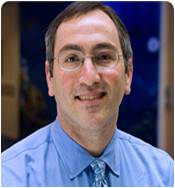
Late last year, David Suskind, MD, shared the good news with The Seattle Times that he saw positive results in the first FDA-approved studies of fecal transplants in children with inflammatory bowel disease (IBD) and, more specifically, in those with Crohn’s disease.
Our blog post on the research, published last June, has generated interest from families as far away as Japan.
Fecal transplants — a hot topic? Actually, it is. The research has been widely covered by the media and is even more important to the patients with IBD and families who clamor for new treatments and information that can make daily living easier and more “normal.” On the Pulse sat down with Suskind to follow up on his research, and to find out what’s next.
How does it feel to be contacted by patient families from around the world?
Suskind: It’s a very exciting time to be in pediatric gastroenterology, and no one else in the country is conducting this type of Crohn’s research in pediatric patients. It’s rewarding to hear from patient families around the world, even though ideally, as a physician, I’d like to make everybody better just with a snap of my fingers.
That’s the dilemma with all research – it’s never as quick as you want it to be. I want all of the studies I’m thinking of to be done, results there and answers given. But patience is a virtue and I’m still working on that part.
How did you decide to take this leap in terms of research?
Suskind: I always like to look outside the box in terms of potential treatments. Part of what excited me about fecal transplant was that it was not only outside of the box in terms of therapies, but that it was also something that targeted the potential trigger of IBD directly. The majority of treatments that are available affect the immune system or inflammation, but IBD is caused by something else, a trigger making the immune system react. That trigger is most likely the fecal microbiome. Fecal transplants are a therapy that affects that trigger, the microbiome.
What does it take to be the first to conduct this type of new research?
Suskind: My desire to see this type of research be conducted is what made it happen. I saw that it had great potential, still does have great potential and that the research is fascinating. I was first because I get very driven when something is really innovative, but also based in good science. When something excites me, I have a tendency to push forward and be very persistent.
What else can you share with us about the fecal transplant research?
Suskind: At this stage, it does not appear to be a cure-all. The important thing to remember is that this is just the beginning. As time goes on, as we learn more and adjust protocols to determine what works for patients, this will bring significant improvements. Unfortunately, research is an arduous process but I am completely committed to seeing it through.
What’s next?
Suskind: We’re analyzing data from the first study and hope to publish results this year. We have funding for our second study, which will be a double-blinded placebo-controlled trial to assure the positive effects we’ve been seeing are not related to a placebo effect. For now, this will just be results as they are related to Crohn’s Disease because in our initial study, patients with ulcerative colitis did not improve with fecal transplant.
How soon will the next study take place?
Suskind: It depends on how quickly it can go through the FDA, but it probably won’t be until the end of the spring/early summer. The study will be open to anybody who resides in the Pacific Northwest, or patients who are committed to the schedule of appointments. If parents think their child may be a fit for the study, they can contact Jani Klein at 206-987-2521.
What else are you working on?
Suskind: I’m writing and editing a guidebook on the Specific Carbohydrate Diet, which has been around for more than 100 years. The diet was started by a pediatrician, Sidney Haas. It was used for celiac disease, and it worked really well. It involves taking all grains out of your diet.
The diet has been out there, quietly being used in IBD, but it hasn’t been used in any formal or consistent way. Over the years I have met a number of individuals on the diet, including children at the hospital. Their positive results sparked my interest. We recently published a paper on our patients and their response to the diet. Currently, we have integrated the diet into our IBD Center.
There is much to look forward to in managing and curing gastroenterological disease and I am excited to move forward to make this happen for our patients and their families.
Resources:
To arrange an interview with Dr. Suskind, please contact the Seattle Children’s public relations team at 206-987-4500 or via [email protected].

